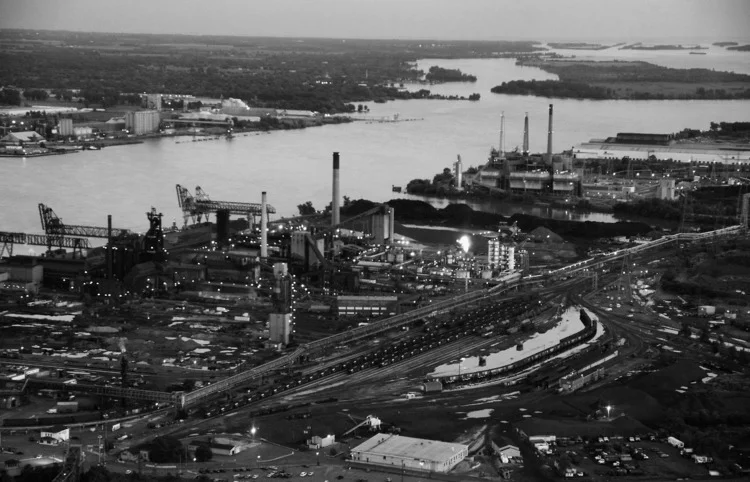© 2014 Karpov, "Industrial Wasteland"
For the last five years, the US has been in clandestine negotiations with eleven countries (Australia, Brunei, Canada, Chile, Japan, Malaysia, Mexico, New Zealand, Peru, Singapore and Vietnam) over a NAFTA-style free-trade agreement: The Trans-Pacific Partnership (TPP). If you haven’t heard much about the TPP, that’s at least in part because the text of this trade deal is not visible to the public, nor is it visible to most of Congress; only an anointed group of 600 corporate “trade advisors” has been allowed to access the full text.
How can a massive trade agreement be shoved through the political process with such little transparency — invisible even to the US Congress? The answer is a shady political expedient devised by the Nixon Administration known as Fast Track. Fast Track takes powers from the legislative branch and gives them to the executive branch. With Fast Track, the executive branch has the power to: select trade partners, sign trade agreements before a Congressional vote, implement truncated voting periods, prohibit Congressional amendments, limit Congressional debate.
Throughout negotiations on the TPP, Obama has used his Fast Track authority to thwart congressional oversight. According to Senator Wyden of Oregon: "The majority of Congress is being kept in the dark as to the substance of the TPP negotiations, while representatives of U.S. corporations — like Halliburton, Chevron, PhRMA, Comcast and the Motion Picture Association of America — are being consulted and made privy to details of the agreement."
Thanks to Wikileaks, key sections of the TPP have been published. Now we can see that the content of the agreement is as concerning as the shadowy political process that is bringing it about. The agreement would remove obstacles that prevent foreign corporations from operating within the borders of signatory states. In this sense, the TPP acts as a matching service for capital and countries, such as Vietnam, with cheap labor and exploitable resources.
But if the TPP will remove most of the obstacles that obstruct the flow of capital in the Pacific Rim, then it will also construct new obstacles to the general well-being of most people in the region. The latter is ensured by the TPP's establishment of an international legal framework that supersedes domestic law for the participating countries. If a signatory state implements legislation that conflicts with the TPP, foreign corporations can sue this state in a World Bank Administrative Tribunal. This gives corporations operating in these eleven countries unprecedented ability to 1) block legislation, 2) threaten to block legislation, or 3) use this new leverage to impact any new legislation which may undermine corporate profit.
Here I’d like to focus on how the TPP will affect the environment, financial regulation, and public health.
The Environment
Under existing US trade deals, more than $3 billion has been paid to foreign corporations in “investor-state disputes” arbitrated in World Bank Tribunals. Over 85% of this money has been paid to companies fighting laws aimed at limiting harm to the environment (i.e., laws that limit the extraction of oil or punish companies for pollution). [1]
The TPP also seems to come into direct conflict with climate change legislation, as it will set firm minimums on the US export of natural gas to signatory countries. Any debates about whether the export of natural gas is in the public interest will be overshadowed by the US’s contractual obligation under the TPP; in fact, for all of its signatories, any debate about how to shift towards renewable energy will be hampered by the restrictions of the TPP.
Public Health
It follows that the environmental degradation that the TPP will facilitate may be bad for public health. The signing of NAFTA provides one particularly ominous example. The US-based Ethyl Corporation used a gasoline additive known as MMT to improve engine performance. When MMT was found to be carcinogenic, the US banned the additive. But when the Canadian government attempted to ban imports of the noxious MMT in 1997, the Ethyl corporation sued the Canadian government for not living up to the standards of NAFTA, which disallowed caps on imports and exports between NAFTA members. Ethyl won; in 1998, the Canadian government reversed its ban, issued a statement publicly supporting the Ethyl Corporation, and paid $13 million to Ethyl in damages. [2]
In a similar vein, Philip Morris is currently engaged in a lawsuit against the Australian and Uruguayan Governments for their attempts to enact legislation which would place more lurid warning labels on packs of cigarettes. The suits that Philip Morris has brought forth in extrajudicial tribunals have yet to be resolved; however, because Australia is a party to the TPP, this case is of particular interest here.
Essentially, under the TPP, corporations will have more legal ground to challenge all legislation which might undermine their profit — even if this legislation has the simple aim of sparing citizens from deadly diseases.
Financial Regulation
The TPP will also set an international freeze on financial regulation; standards for the finance industry under this agreement will have precedence over domestic attempts to oversee financial activity. The most startling example is that the TPP would forbid signatory states from the banning of the same toxic derivatives that were integral in the 2008 financial crisis. If the TPP is signed, any attempts by the US government to regulate finance — whether it attempts to tax speculative activities, or, perhaps, to reinstate the Glass-Steagall Act, which from 1933 until 1999 segregated the activities of banks and securities firms, preventing the pervasive speculation which led to the Great Recession — would allow companies to sue the US government in a World Bank Tribunal for damages, to be paid for by US taxpayers.
Thus, the TPP would make national governments powerless to limit financial speculation.
****************
Amidst all the harm that the TPP will cause, it is important to ask why, then, is the Obama administration in such a hurry to complete the agreement. Can we analyze the agreement simply in terms of power? Just as NAFTA helped create a handful of Mexican billionaires, such as Carlos Slim, while simultaneously creating the conditions for the widespread poverty and violence which in part led to our country’s immigration crisis, the TPP will certainly also empower new magnates to profit in the Pacific Rim by ensuring that public welfare does not stop them from reaping the benefits of privatization. And just as Central American countries that were initially unwilling to sign CAFTA, NAFTA’s Central American spin off, soon found out that signing the agreement had become an intractable condition of their access to international loans and humanitarian aid — the less powerful of the TPP signatories like Vietnam and Singapore were probably similarly coerced into signing. [3]
Is that the entire story? Powerful governments ignoring the well being of the world’s population in order to facilitate the fortune-making of their corporate benefactors?
I think there is something more elemental and pressing behind the Trans-Pacific Partnership. As David Harvey has written, “The survival of capitalism in the long run relies on a compound rate of 3% growth.” [4] This expansionary tendency is absolutely central to capitalism. As opportunities for profit tend to diminish over time in a certain location, competition between firms becomes more and more intense, putting downward pressure on profit, and capitalists eventually need to seek avenues for their capital elsewhere, or else their profits will diminish, and they will not be capitalists for long.
This is why the logic of capitalism is so necessarily destructive. Imagine a world where there are only two rival companies: Company X and Company Y. If Company X cuts costs by offshoring to Vietnam where labor costs are cheaper, then Company Y can only compete with Company X for so long if it operates a factory in Pittsburgh, where labor costs are much higher. If, on the other hand, neither company offshores, there will be a slow war of attrition between the two: any time one lowers their prices in attempt to gain a competitive advantage, this means that the other must either lower their prices as well, or invest more of their surplus back into their company in, say, technology or marketing, in order to regain their market share. Markets must be continually opened up in order to prevent the latter example of a profit squeeze from becoming endemic.
Here we can see not only the benefit, but the necessity of trade agreements like the TPP. Not only do they help make the rich richer, but they smooth the path for capital to move freely so that levels of profit remain above a tolerable level, ensuring that enough incentives for capitalists to remain capitalists are in place, and that situations where capitalists worldwide are not making profit, otherwise known as financial crises, are temporarily averted. It follows, however, that capitalism goes hand in hand with inequality: what is good for the capitalist operating a plant in a place like Vietnam is rarely good for the Vietnamese laborers.
This tension between what the capitalist needs and what the citizenry wants is a core contradiction of capitalism. The TPP, along with its underhanded gestation period, is just another bitter outcome of this contradictory relation.
Despite attempts to prevent the public from learning about the agreement, an international movement against the Trans-Pacific Partnership is coalescing. To learn more about the TPP, and to join the movement, visit www.exposethetpp.org.
//Mark Jay is a co-founder of The Periphery.
Sources:
[1] http://www.exposethetpp.org/TPPImpacts_TheEnvironment.html
[2] http://www.international.gc.ca/trade-agreements-accords-commerciaux/topics-domaines/disp-diff/ethyl.aspx?lang=eng
[3] http://www.thirdworldtraveler.com/NAFTA_FTAA/CAFTA_Debt_Trap.html
[4] David Harvey. 2010. The Enigma of Capital. Page 130.


